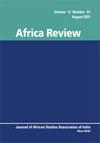当代地方治理和土著机构:埃塞俄比亚南部Sidaama的案例*
IF 0.5
Q4 AREA STUDIES
引用次数: 5
摘要
当今世界,世界各国的治理实践正在发生巨大的变化和完善。在许多国家,特别是象埃塞俄比亚这样的发展中国家,民主权力下放已成为一个严重的问题。埃塞俄比亚历届政府都引进并实施了现代治理体系。尽管存在着土著机构,这些机构在指导社会的社会政治生活方面一直发挥着不可或缺的作用,特别是在农村地区社区填补正式国家机构的空白方面。考虑到现代制度的局限性,依靠传统制度可能是改善地方治理的一个有吸引力的选择。这是因为,与国家机构相比,传统机构不需要从头开始建设。在地方一级建立新的和有效的国家机构可能是困难的、昂贵的和耗时的。因此,本研究采用了定性研究方法,通过收集来自西达马省的实际证据来调查土著机构和地方治理。最后,研究结果表明,适当利用本土机构是改善研究地区正规地方治理机构绩效的良好机制。本文章由计算机程序翻译,如有差异,请以英文原文为准。
Contemporary local governance and indigenous institutions: the case of the Sidaama, Southern Ethiopia*
ABSTRACT In the contemporary world, enormous changes and improvement are taking place in governance practices throughout the world. Democratic decentralization, in particular, has become a serious concern in many countries, especially in developing countries like Ethiopia. Successive Ethiopian governments have introduced and implemented modern governance system. This happened despite the existence of indigenous institutions which have been playing an indispensable role in guiding the social-political lives of the societies, especially for the rural area communities in filling the gap of the formal state institutions. Given the limitations of modern institutions, relying on traditional institutions could be an attractive option to improve local governance. This is because, when compared with state institutions, traditional institutions do not need to build from the beginning. At the local level creating new and efficient state institutions can be difficult and costly and time-consuming. Accordingly, the qualitative research methodology was employed in the study for its appropriateness to investigate indigenous institutions and local governance by collecting practical evidence from Sidaama province. Eventually, the findings of the study revealed that properly employing indigenous institutions are good mechanisms for improving the performance of formal local governance institutions in the study area.
求助全文
通过发布文献求助,成功后即可免费获取论文全文。
去求助
来源期刊

Africa Review
AREA STUDIES-
CiteScore
1.80
自引率
12.50%
发文量
22
期刊介绍:
Africa Review is an interdisciplinary academic journal of the African Studies Association of India (ASA India) and focuses on theoretical, historical, literary and developmental enquiries related to African affairs. The central aim of the journal is to promote a scholarly understanding of developments and change in Africa, publishing both original scholarship on developments in individual countries as well as comparative analyses examining the wider region. The journal serves the full spectrum of social science disciplinary communities, including anthropology, archaeology, history, law, sociology, demography, development studies, economics, education, gender studies, industrial relations, literature, politics and urban studies.
 求助内容:
求助内容: 应助结果提醒方式:
应助结果提醒方式:


